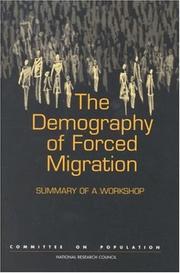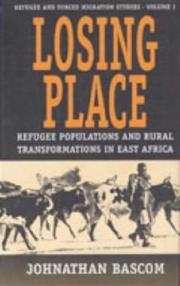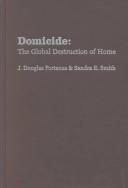| Listing 1 - 10 of 126 | << page >> |
Sort by
|
Book
ISBN: 9587385594 9587385586 Year: 2015 Publisher: SciELO Books - Editorial Universidad del Rosario
Abstract | Keywords | Export | Availability | Bookmark
 Loading...
Loading...Choose an application
- Reference Manager
- EndNote
- RefWorks (Direct export to RefWorks)
La Universidad del Rosario, por conducto del Observatorio Legislativo y el Grupo de Investigación en Derechos Humanos de la Facultad de Jurisprudencia, en asocio con la Fundación Hanns Seidel, organizaron el IV Concurso Nacional de Semilleros titulado "Democracia y Desplazamiento Forzado: un análisis desde diversas perspectivas”, el cual se realizó en el marco del Foro "El Desplazamiento Forzado en Colombia: 10 años de la Sentencia T-025 de 2004”, buscando analizar el estado actual del desplazamiento en Colombia y qué ha pasado con las órdenes impartidas por la Corte Constitucional hace 10 años así mismo, el objetivo era reconocer los cambios que han existido en la situación de hecho y de derecho de la población desplazada y cuáles son las nuevas dinámicas que han surgido alrededor de esta problemática y que seguramente no existían cuando la Corte profirió tan importante sentencia. De las ponencias recibidas por parte de las diferentes instituciones educativas del país, fueron seleccionadas doce para participar en la fase oral que se dio cita los días 5 y 6 de agosto de 2014, en la Universidad del Rosario. Estas ponencias daban cuenta, desde distintos escenarios, del estado del desplazamiento forzado en Colombia, tal como se propuso con el Foro, pero desde las perspectivas de los estudiantes, quienes a partir de la investigación formativa analizaron el fenómeno. Tanto la fase oral como la escrita, contaron con la participación de profesores de altas calidades profesionales y académicas que actuaron como pares evaluadores y jurados, certificando así la calidad de las ponencias presentadas y ello los resultados obtenidos. Con este ejercicio pedagógico se observaron los resultados y la importancia de la investigación formativa en las facultades de Derecho y todas las carreras afines, siendo el presente libro una prueba y resultado de ello.
Forced migration --- Peace-building --- Law and legislation --- Cleansing, Ethnic --- Compulsory resettlement --- Ethnic cleansing --- Ethnic purification --- Involuntary resettlement --- Migration, Forced --- Purification, Ethnic --- Relocation, Forced --- Resettlement, Involuntary --- Migration, Internal
Book
ISBN: 1108390153 1108380077 1108422063 1108386555 Year: 2019 Publisher: Cambridge : Cambridge University Press,
Abstract | Keywords | Export | Availability | Bookmark
 Loading...
Loading...Choose an application
- Reference Manager
- EndNote
- RefWorks (Direct export to RefWorks)
This volume brings together critical legal scholarship and theories of forced migration that draw attention to the dual role of law as it pertains to transitional justice and mass violence resulting in forced population movements. Contributors to the volume analyze how forced migration in the Global South have impacted contemporary realities. While there has been considerable focus on refugees and asylum seekers from conflict zones, there is less attention paid to the far more numerous internally displaced peoples (IDPs), stateless people, warehoused refugees, non-status displaced and returnees in the Global South. In this volume, a multidisciplinary group of scholars question the reasons behind the restrictive choices that lock us into area studies modalities instead of genuine interdisciplinary analysis by linking the traditional subject matter of transitional justice with the realities of forced migration in the Global South.
Transitional justice. --- Forced migration. --- Cleansing, Ethnic --- Compulsory resettlement --- Ethnic cleansing --- Ethnic purification --- Involuntary resettlement --- Migration, Forced --- Purification, Ethnic --- Relocation, Forced --- Resettlement, Involuntary --- Migration, Internal --- Justice --- Human rights
Book
ISBN: 9780198725787 0198725787 0191038520 0191792780 9780191038525 9780191792786 Year: 2015 Publisher: Oxford
Abstract | Keywords | Export | Availability | Bookmark
 Loading...
Loading...Choose an application
- Reference Manager
- EndNote
- RefWorks (Direct export to RefWorks)
This work addresses the mass expulsion of Germany's unwanted residents, including socialists, Jesuits, Danes, colonial subjects, French nationalists, Poles, and 'Gypsies', between 1871 and 1914.
Forced migration --- Migration forcée --- History --- Histoire --- Germany --- Allemagne --- Migration forcée --- Cleansing, Ethnic --- Compulsory resettlement --- Ethnic cleansing --- Ethnic purification --- Involuntary resettlement --- Migration, Forced --- Purification, Ethnic --- Relocation, Forced --- Resettlement, Involuntary --- Migration, Internal --- 1800 - 1999

ISBN: 0309061415 9786612081699 1282081691 0309520363 0585144559 9780585144559 6612081694 9780309061414 0305061415 0309173892 Year: 1998 Publisher: Washington, DC National Academy Press
Abstract | Keywords | Export | Availability | Bookmark
 Loading...
Loading...Choose an application
- Reference Manager
- EndNote
- RefWorks (Direct export to RefWorks)
Forced migration --- Refugees --- Congresses. --- Refugees - Congresses. --- Business & Economics --- Demography --- Congresses --- Cleansing, Ethnic --- Compulsory resettlement --- Ethnic cleansing --- Ethnic purification --- Involuntary resettlement --- Migration, Forced --- Purification, Ethnic --- Relocation, Forced --- Resettlement, Involuntary --- Migration, Internal
Book
ISBN: 9264285598 926428558X Year: 2017 Publisher: Paris : OECD Publishing,
Abstract | Keywords | Export | Availability | Bookmark
 Loading...
Loading...Choose an application
- Reference Manager
- EndNote
- RefWorks (Direct export to RefWorks)
Forced migration. --- Humanitarian assistance --- Economic aspects. --- Management. --- Humanitarian aid --- International relief --- Cleansing, Ethnic --- Compulsory resettlement --- Ethnic cleansing --- Ethnic purification --- Involuntary resettlement --- Migration, Forced --- Purification, Ethnic --- Relocation, Forced --- Resettlement, Involuntary --- Migration, Internal

ISBN: 1571810838 1782381848 1571818308 Year: 1998 Volume: v.3 Publisher: New York, N.Y. Berghahn
Abstract | Keywords | Export | Availability | Bookmark
 Loading...
Loading...Choose an application
- Reference Manager
- EndNote
- RefWorks (Direct export to RefWorks)
"Refugee flight, settlement, and repatriation are not static, self-contained, or singular events. Instead, they are three stages of an ongoing process made and mirrored in the lives of real people. For that reason, there is an evident need for historical and longitudinal studies of refugee populations that rise above description and trace the process of social transformation during the "full circle" of flight, resettlement, and the return home. This book probes the economic forces and social processes responsible for shaping the everyday existence for refugees as they move through exile."--Jacket.
Eritreans --- Refugees --- Migration. Refugees --- Economic geography --- East Africa --- Ethnology --- Forced migration. --- Cleansing, Ethnic --- Compulsory resettlement --- Ethnic cleansing --- Ethnic purification --- Involuntary resettlement --- Migration, Forced --- Purification, Ethnic --- Relocation, Forced --- Resettlement, Involuntary --- Migration, Internal

ISBN: 1282859625 9786612859625 0773569618 9780773569614 0773522573 9780773522572 0773522581 9780773522589 9781282859623 6612859628 Year: 2001 Publisher: Montreal, Que. McGill-Queen's University Press
Abstract | Keywords | Export | Availability | Bookmark
 Loading...
Loading...Choose an application
- Reference Manager
- EndNote
- RefWorks (Direct export to RefWorks)
"Their eyes see rubble, former exiles see home" Globe and Mail, 23 June 2000 Douglas Porteous and Sandra Smith begin their analysis by examining just how important home is to human life and community. Using a multitude of case studies of displacement, they derive a theoretical framework that addresses the methods, effects of, and motives for domicide. Two case studies of resettlement resulting from hydro-electric power development in British Columbia are used to test this framework. Porteous and Smith assess the implications of loss of home, evaluate current efforts at mitigation, suggest better policies to alleviate the suffering of the dispossessed, and - as a last resort - urge resistance against unacceptable projects.
Forced migration. --- Relocation (Housing) --- Home. --- Families --- Marriage --- Housing --- Slums --- Cleansing, Ethnic --- Compulsory resettlement --- Ethnic cleansing --- Ethnic purification --- Involuntary resettlement --- Migration, Forced --- Purification, Ethnic --- Relocation, Forced --- Resettlement, Involuntary --- Migration, Internal --- Forced migration --- Home --- Social aspects --- Migración forzada. --- Realojo (Vivienda) --- Hogar.
Book
ISBN: 0773582851 0773582835 9780773582835 9780773582859 9780773545168 Year: 2015 Publisher: Montreal Kingston
Abstract | Keywords | Export | Availability | Bookmark
 Loading...
Loading...Choose an application
- Reference Manager
- EndNote
- RefWorks (Direct export to RefWorks)
At the start of 2014, more people were displaced globally by conflict and human rights violations than at any time since the Second World War. Although many of those displaced, from countries such as Syria, Iraq, Colombia, Kenya, and Sudan, have survived grave human rights abuses that demand redress, the links between forced migration, justice, and reconciliation have historically received little attention. This collection addresses the roles of various actors including governments, UN agencies, NGOs, and displaced persons themselves, raising complex questions about accountability for past injustices and how to support reconciliation in communities shaped by exile. Forced Migration, Reconciliation, and Justice draws on a variety of disciplinary perspectives including political science, law, anthropology, and social work. The chapters range from case studies in countries such as Bosnia, Cambodia, Lebanon, Turkey, East Timor, Kenya, and Canada, to macro-level analyses of trends, interconnections, and theoretical dilemmas. Furthermore, the authors explore the contribution of trials and truth commissions, as well as the role of religious practices, oral history, theatre, and social interactions in addressing justice and reconciliation issues in affected communities. In doing so, they provide fresh insight into emerging debates at the centre of forced migration and transitional justice. Exploring critical issues in political science and development studies, this provocative collaboration unites leading researchers, policymakers, human rights advocates, and aid workers to examine the theoretical and practical relationships between displacement, transitional justice, and reconciliation. Contributors include Ian B. Anderson (Department of Foreign Affairs, Trade and Development Canada), John Bell (Toledo International Center for Peace), Chaloka Beyani (London School of Economics), Mateja Celestina (Coventry University), Ayse Betül Çelik (Sabanci University), Mick Dumper (Exeter University), Roger Duthie (International Center for Transitional Justice), Huma Haider (University of Birmingham), Nancy Maroun (United Nations Development Programme Office in Lebanon), James Milner (Carleton University), Mike Molloy (University of Ottawa), Paige Morrow (Frank Bold), Lisa Ndejuru (Concordia University), Thien-Huong T. Ninh (California State University, Dominguez Hills), Anneke Smit (University of Windsor), Roberto Vidal López (Pontifica Universidad), Luiz Vieira (formerly with IOM), Nicole Waintraub (University of Ottawa), Jennifer Winstanley (lawyer).
Forced migration. --- Reconciliation. --- Social justice. --- Equality --- Justice --- Peace making --- Peacemaking --- Reconciliatory behavior --- Quarreling --- Cleansing, Ethnic --- Compulsory resettlement --- Ethnic cleansing --- Ethnic purification --- Involuntary resettlement --- Migration, Forced --- Purification, Ethnic --- Relocation, Forced --- Resettlement, Involuntary --- Migration, Internal
Book
ISBN: 9004319778 9789004319776 9789004297838 9004297839 Year: 2016 Publisher: Leiden Boston
Abstract | Keywords | Export | Availability | Bookmark
 Loading...
Loading...Choose an application
- Reference Manager
- EndNote
- RefWorks (Direct export to RefWorks)
Human Rights, Hegemony and Utopia in Latin America: Poverty, Forced Migration and Resistance in Mexico and Colombia by Camilo Pérez-Bustillo and Karla Hernández Mares explores the evolving relationship between hegemonic and counter-hegemonic visions of human rights, within the context of cases in contemporary Mexico and Colombia, and their broader implications. The first three chapters provide an introduction to the book´s overall theoretical framework, which will then be applied to a series of more specific issues (migrant rights and the rights of indigenous peoples) and cases (primarily focused on contexts in Mexico and Colombia,), which are intended to be illustrative of broader trends in Latin America and globally.
Human rights --- Immigrants --- Forced migration --- Emigrants --- Foreign-born population --- Foreign population --- Foreigners --- Migrants --- Persons --- Aliens --- Cleansing, Ethnic --- Compulsory resettlement --- Ethnic cleansing --- Ethnic purification --- Involuntary resettlement --- Migration, Forced --- Purification, Ethnic --- Relocation, Forced --- Resettlement, Involuntary --- Migration, Internal --- Crimes against
Book
ISBN: 3838267230 9783838267234 9783838207230 3838207238 9783838206936 Year: 2015 Publisher: Stuttgart Ibidem-Verlag
Abstract | Keywords | Export | Availability | Bookmark
 Loading...
Loading...Choose an application
- Reference Manager
- EndNote
- RefWorks (Direct export to RefWorks)
Forced migration --- Economic development --- Cleansing, Ethnic --- Compulsory resettlement --- Ethnic cleansing --- Ethnic purification --- Involuntary resettlement --- Migration, Forced --- Purification, Ethnic --- Relocation, Forced --- Resettlement, Involuntary --- Migration, Internal --- Social aspects. --- Coopération internationale. --- Droit humanitaire. --- Réfugiés. --- Migration. Refugees --- Developing countries: economic development problems
| Listing 1 - 10 of 126 | << page >> |
Sort by
|

 Search
Search Feedback
Feedback About UniCat
About UniCat  Help
Help News
News